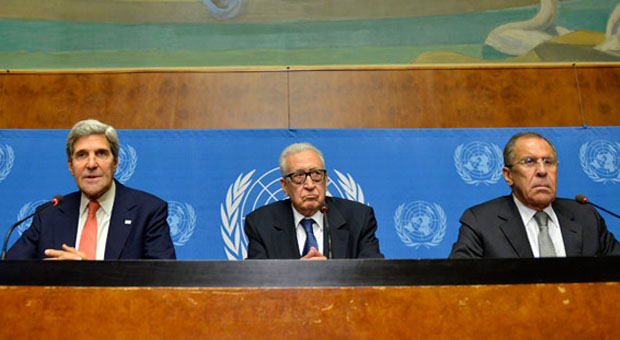
From Left: John Kerry, Lakhdar Brahimi, and Sergey Lavrov
After less than half an hour of joint session talks on Saturday, February 15, the second round of the Geneva II conference on Syria has abruptly ended. In a press conference shortly after, joint United Nations-Arab League negotiator, Lakhdar Brahimi apologized to the Syrian people for the almost complete failure of the negotiations, “I am very, very sorry and I apologize to the Syrian people that their hopes which were very very high here, that something will happen here.”
The final 27-minute discussion, a last ditch effort to end the stalemate, seems to have broken down after the government delegation rejected the suggested agenda for the third round. It was proposed that a one-day discussion on violence and terrorism, the government’s main concern, would be followed by another one-day talk on a transitional governing body. According to McClatchy, the government was not pleased with the way the third round of talks would be held; with alternating days between topics. Instead, the regime of Bashar al-Assad has stuck to its line that violence and terrorism must be dealt with before a discussion on a transitional body begins.
Among the opposition, this has raised a number of doubts as to whether the government is committed to discussing a transitional process at all; given that a transitional governing body is the end goal of the Geneva process. In light of today’s failed discussions, the opposing sides traded accusations and pointed finger at one another for the continued stalemate.
With no schedule set for the third round of talks and the two sides at an impasse, the future of the Geneva II conference on Syria is now in doubt, with the Syrian people paying the price. According to the Syrian Network for Human Rights, 2,247 civilians have been killed by the regime since the talks began on February 10. The number since the beginning of the Geneva II process is thought to be close to 5,000.
Brahimi’s frustration was clear during the final press conference of the second round as he told reports, “I think it is better that every side goes back and reflects on its responsibility [and if] it wants this process to continue or not.” The Joint U.N.-Arab League envoy has stated that he will now contact both the Secretary of State, John Kerry and Russian Foreign Minister, Sergey Lavrov, to discuss further steps.
Over the coming days Brahimi will likely attempt to get both the U.S. and Russia to put pressure on their Syrian allies to attend the next round of talks and most importantly, to negotiate in good faith. In doing so, he will look for a firm commitment by both sides to support the negotiation process and to get their Syrian allies to do the same.
Though, in doing so Brahimi may be talking to those most responsible for the stalemate at Geneva II. Already, both external backers have blamed the opposing delegations for the impasse, with the U.S. accusing the regime of not taking the talks seriously and Russia blaming both the U.S. and the opposition for imposing their political agenda on the Syrian government. At the U.N. Security Council this week, discord between the two external backers was evident when Russia refused to support a draft resolution on humanitarian aid that would have punitive consequences for those blocking aid to besieged communities.
Such explicit statements and dug-in positions have done little to build confidence among the negotiating parties in Geneva and have helped to impede the work of Mr. Brahimi during the second round. On the ground Russia, alongside Iran, continues to provide the Syrian Army and its proxy militias with the armaments it needs to carve out a statelet in the center of the country; from Damascus to the coast. For its part, the opposition is highly divided and focused on a two front conflict against the Islamic State of Iraq and al-Sham and the Syrian regime. While weapons and fighters are consistently supplied to the government in Damascus, the moderate rebels of the Syrian Revolutionary Front (now tied to the external opposition) have not received sorely needed munitions from the U.S. and its Arab allies.
The current impasse should not solely be seen as the fault of the Syrian belligerents; for it is Moscow’s unwavering support for Damascus and the unwillingness of the U.S. to supply rebels with the required weaponry (and hands-on support) to pressure Assad that has made Geneva II a failure thus far. Hopefully, the anti-tank and anti-aircraft weapons slated to be sent by Saudi Arabia to the Syrian Revolutionary Front can help change the dynamics on the ground and in turn, Assad’s and Russia’s calculations. Though, in order to do so, the U.S. must take a commanding role. Assad and Russia must believe that the U.S. is serious about transition, both on the battlefield and in the halls of the Montreux hotel — only then will the regime have an incentive to negotiate.